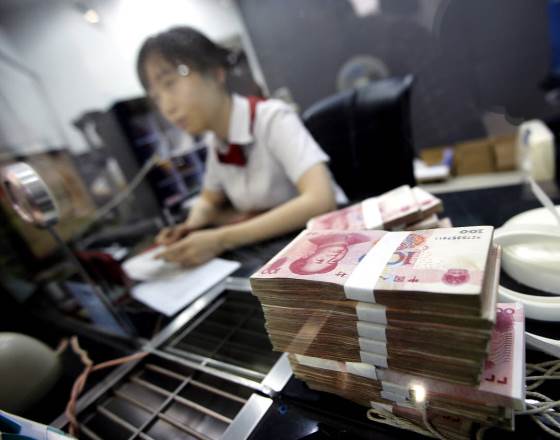
U.S. opposition could still upend Beijing’s attempt to put yuan in same league as dollar
China is gaining support from key U.S. allies in its push to gain reserve-currency status for the yuan, but opposition from the Obama administration threatens to upend Beijing’s bid to flex more muscle in the global economy.
Chinese leaders are trying to persuade the International Monetary Fund to label the yuan a reserve currency, a move that would put it in an elite group that includes dollar, the euro and the yen. The move could also help accelerate the liberalization of China’s long-closed financial markets.
A reserve-currency status would also accelerate demand for the yuan—also known as therenminbi, or the people’s currency—by the world’s central banks. That would be a key step in elevating China’s role the international economy at a time when Beijing is trying to challenge U.S. political and economic dominance around the world.
Top finance officials from Germany and Australia this week said their governments are throwing their weight behind Beijing’s request. U.S. Treasury Secretary Jacob Lew, however, signaled Tuesday that the administration won’t back the proposal unless China takes major steps to overhaul its economy.
Internationalization of China’s currency, he said, required “a more market-determined exchange rate, interest-rate liberalization as well as strengthening of financial regulation and supervision.”
China is making progress: Beijing unveiled plans this week to roll out bank deposit insurance in May, a critical element in revamping its financial sector.
Beijing’s growing economic clout has renewed tensions between the China and the U.S. The White House suffered a diplomatic bruising after several U.S. allies in recent weeks rejected administration pleas to snub a new Beijing-led infrastructure bank that would rival the U.S.-led World Bank. The allies—including the U.K., France, Germany and Australia—instead said they would become founding members.
Some of those same countries are now at odds with the U.S. position on the yuan.
“We’re supportive of China’s efforts to integrate its economy into the world’s economy,” Australian Finance Minister Mathias Cormann said on the sidelines of a recent economic forum in China.
Chinese officials are lobbying other core IMF member countries in Europe and around the world. Beijing expects to win support from countries that have been actively promoting the use of the yuan in currency markets and to pay trade bills in recent years, including the U.K. and France. But China is expecting pushback from the U.S., whose vote at the IMF could potentially make or break China’s bid.
To be awarded reserve-currency status by the IMF, the yuan must be “freely usable,” a term that leaves wide interpretation by the executive board that will rule on the issue later this year. China’s policy of carefully managing the yuan’s value doesn’t necessarily rule it out from consideration.
Beijing has fostered greater international use of the yuan over the past several years, a policy that could help meet the fund’s “freely usable” criterion. The amount of China’s trade that was paid for in yuan, for example, has risen from 0.02% in 2009 to nearly 25% last year, according to the Hong Kong Commissioner’s office. There are also now 15 offshore clearing centers for the yuan scattered around the world, while more than 20 central banks—including in Russia, the U.K. and Australia—have signed currency-swap agreements totaling about $430 billion with China.
The U.S. hopes China might speed up its financial sector reforms to win reserve-currency status. “It’s fortuitous timing,” Mr. Lew said. “It will be an incentive to make the kinds of reforms that are needed.”
In China last week, IMF Managing Director Christine Lagarde said the organization shared Beijing’s interest in getting the yuan in the IMF’s reserve currency basket. It was more a matter of when, not if, it should be included, she said.
To be sure, even if the yuan is recognized by the IMF as a reserve currency, there’s little chance of it dethroning the dollar as king. Currently, the greenback represents more than 60% of all global currency reserves. Even optimistic economists say it could take a decade or two for the yuan to reach just a fraction of that level.
For now, China’s IMF bid still faces headwinds. And while the yuan’s use in trade has surged, the country’s restrictions on capital flows in and out of the country raise questions about whether the currency has met the IMF’s criteria to be “freely usable,” said Zhu Min, a deputy managing director at the IMF.
Some of China’s reform-minded officials, led by long-serving central bank Gov. Zhou Xiaochuan, are also using the reserve-currency bid as a way to lobby the Chinese leadership to speed up revamping China’s troubled financial sector, according to officials at the People’s Bank of China.
Still, if China’s government moves ahead with its promised economic overhauls, it could win U.S. support later this year.
U.S. officials see the effort as “somewhat inevitable,” said Eswar Prasad, a Cornell University professor and former China head of the IMF. “What they’re trying to do, however, is to make sure that there is, in fact, a bargain and that the IMF doesn’t give this away too easily.”
original source: http://www.wsj.com/articles/momentum-builds-to-label-chinese-yuan-a-reserve-currency-1427926918
